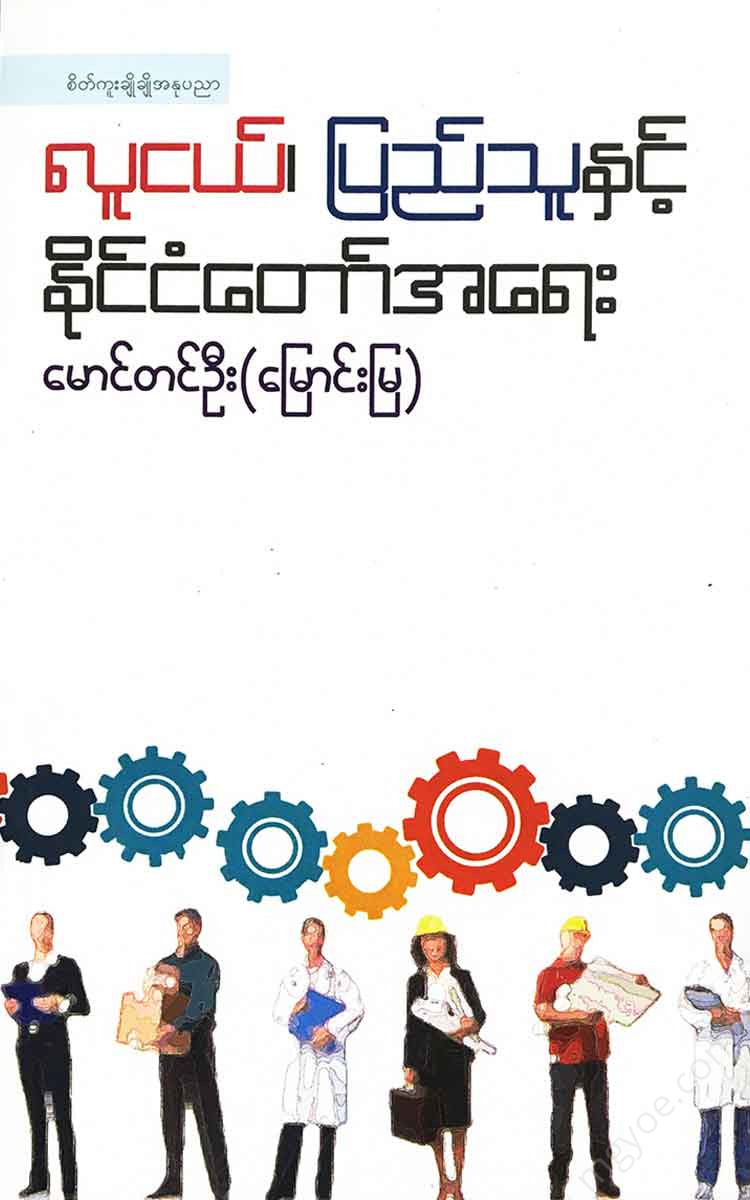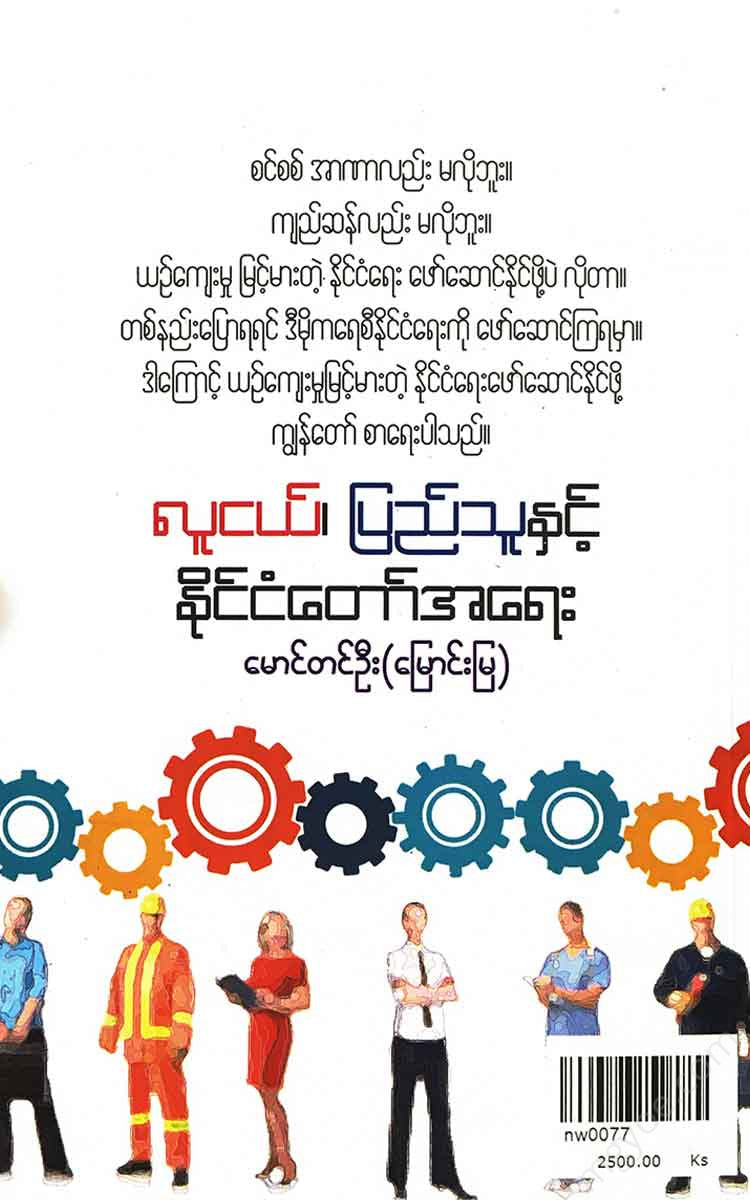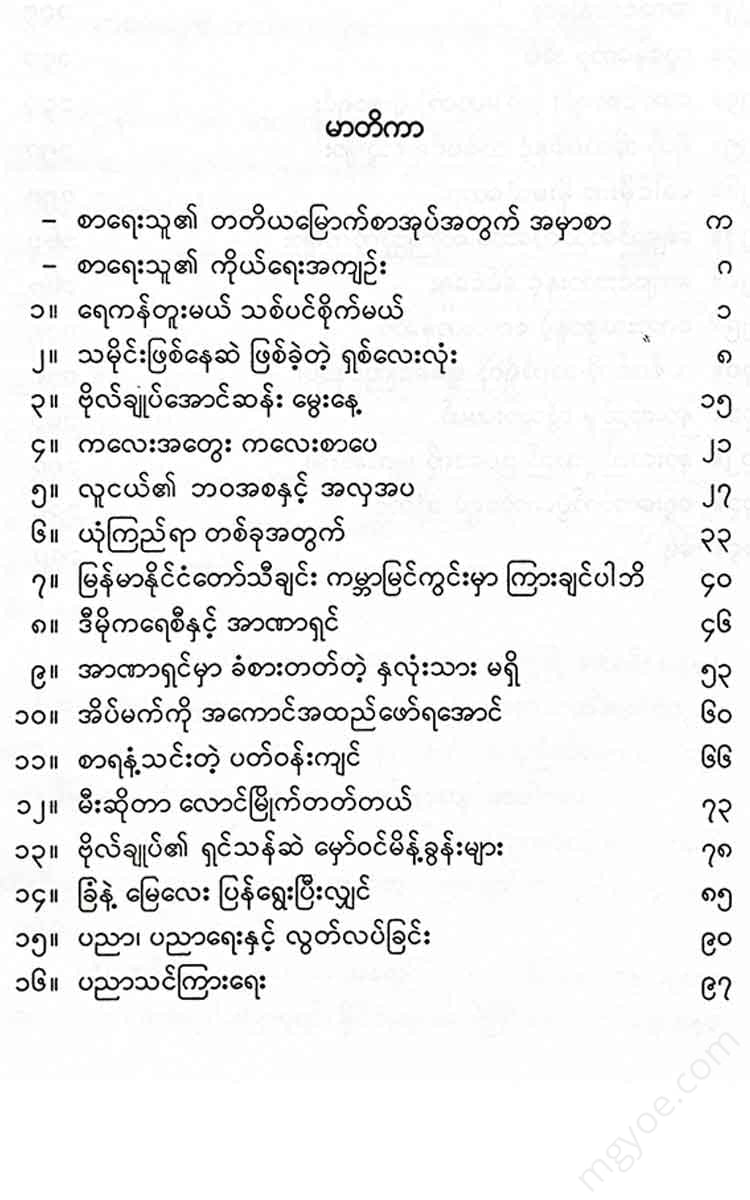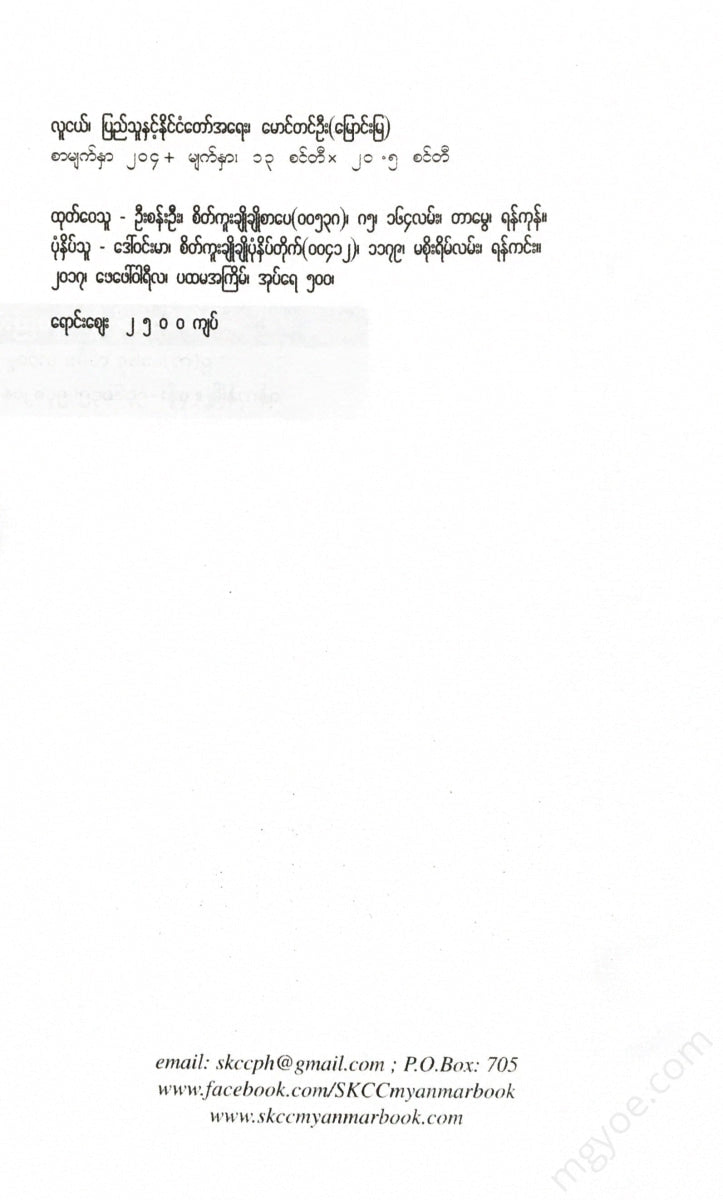စိတ်ကူးချိုချိုစာပေ
Maung Tin Oo (Myaung Mya) - Young People and State Affairs
Maung Tin Oo (Myaung Mya) - Young People and State Affairs
Couldn't load pickup availability
I will dig a pond and plant trees.
Rain
I miss the rain. I look forward to the rain. Come back, rain. It's been a long time since I've seen the rain. Without the rain, life would be so dry.
Don't be cruel, Rain.
Actually, I wrote this letter because I miss the girl named Moe. But the rain (water) that is calm and peaceful in the sky is more cruel than the girl named Moe. Many people are waiting for the rain to pour down from the sky. People who have been suffering from the heat of the sun since the first day of the month of Tapotwe. The paddy fields that young women used to hang on their heads on Thingyan Day, the ponds that appeared under the cracked soil, the thirsty trees and flowers, the wells in the monastery, ....... all are waiting for the rain.
" Let it rain, let it rain, let it rain, let it rain, let it rain, it's been a long time since we've seen any rain. The wind and rain are coming."
A poem by Dawei Daing Than. A poem from more than fifty years ago. People always long for rain when it is time. It is clear that they always look forward to it. Rain is actually water. Water has existed since before the emergence of living beings. Living beings, humans, are born from the proportional combination of the four elements water, earth, air, and fire. Water constitutes two-thirds of living beings. The world is made up of three-quarters of water and one-fourth of earth. Yet water is scarce. The rain is dry. The rain is cruel.
It's going to rain.
No matter what. When the time comes, the rain will fall. It will rain in June. It will rain in July. It will rain late. The rain will definitely fall. What will we do if it rains? If it rains, we will take a shower. If it rains, my mother will come and breastfeed me. If it rains, I will eat coconuts.
Is this a traditional saying? A proverb? A saying? A saying? I don't know what kind, but it's a saying. It's a common saying. Even the elders say it. Even the children say it. It's good to say it.
Now we need to change these words. It's not something we usually say. We need to say it. We need to try to make it a habit. It won't happen if we don't do it.
We'll dig a pond before it rains. When Dad comes, we'll plant a tree. When Mom comes, we'll go to the well and draw fresh water.
Dig a reservoir.
Singapore is surrounded by saltwater. The land is narrow. But they have man-made reservoirs to collect rainwater. Malaysia has to get its water for drinking and domestic purposes, but their country is not short of water or thirsty. Don't make excuses because it has few people. Their population is large in proportion to their land area and population. But there is no shortage of water.
There are many rivers, streams, lakes, and wells in Myanmar that produce fresh water. But when it rains, do you only take a shower in the rain? I remember my childhood when I would take a shower in the rain. Until my lips turned blue. Until the boat sank. It was so much fun.
Don't stop children from taking a shower when it rains. But adults should use rain water harvesting. Dig ponds before the rain in consultation with knowledgeable people on suitable land. Dig ponds such as earthen ponds, brick ponds, cement ponds, etc. If possible, dig ponds. Keep the dug ponds clean. Do not throw garbage. Fence them so that animals do not enter the ponds. Do not dig ponds and leave them there. Take care of them if you have to. If you don't have to, don't take care of them.
When you were a child, you must have heard the story of the ninety-thousand Hinthas in primary school. The Hinthas took shelter in a large natural cave to avoid the heavy rains. They generally stored food for the four months of the rainy season in advance in the cave. One year, their food supply was almost exhausted, but the rainy season had not yet ended. So they ate and ate and ate and waited for the rainy season to end. But the rain had not stopped. It was still raining.
At this time, the giant spider in the cave had spun four layers of webs. It had been spinning for a month. Now, it had been four months, so it had been four layers. If it continued for another month, the web would have been five layers. The webs were also the fibers of the giant spider, so it was very difficult for a hyena to cut through a single web.
So the food supply was gone. The Hinthas were also starving and weak. It was time to cut the spider web. Finally, the Hinthas sat in a meeting. The meeting decided that the Hinthas would kill the old Hinthas and eat them. They would cut the spider web when they had enough strength. In fact, the Hinthas who had eaten the same caste did not have enough strength. So they got stuck in the spider web and were eaten by the spider. When the old men and women were gone, the young Hinthas killed and ate the young Hinthas again. The Hinthas cut the spider web again. However, the nine thousand Hinthas who were not united, they ended up eating the same caste. The lesson that I emphasized in my childhood was that we should not eat the same caste. The teacher taught us that we should be united with each other.
Another lesson I've learned as an adult is that preparation is important. We need to prepare for the worst. If we don't want to be caught off guard, we need to live with the mindset of being prepared for everything.
Many of the disasters we are currently experiencing are the consequences of what we did not prepare for in the past and ignored in the past. Air conditioners were invented. Refrigerators became widely used. But we did not prepare to prevent the side effects of these. We became ignorant. And so the ozone layer was destroyed. El Niño and La Niña occurred. We only realized it when it was too late to solve the problem. It was a late realization.
But it's still better to start knowing now than too late. We need to start knowing now, preparing now, and applying now. If we don't delay any further, we'll be on time.
Rainwater harvesting is a gift from nature. For the rain water cycle to occur, it is necessary to have land, rivers, and lakes. Forests and trees are also essential. Therefore, we must store the rain water that nature gives us. We must collect it so that it does not go to waste. Water reservoirs should be in the middle of the village. At the top of every village. We must manage it so that water does not seep into the ground. These are not very difficult. Before the development of technology, ancient people used to dig reservoirs and store water. Meiktila Lake is a prominent example. The lakes that nature has gifted us are Inle Lake, Moe Yun Gyi Lake, and In Taw Lake, which are not only for people but also for birds. They are a source of dependence.
Similarly, there are many small lakes nearby that are not obvious by their names but are a source of help for those who are looking for shelter. “The water around the lake is at the top of the village, next to the temple,” the Twantay Thein Tanka song pointed out the lakes. If there is a lake, small trees will grow around the lake. If there are small trees, birds will find shelter. It will be an oasis for humans to escape the heat. .
So, don't let humans lose the rain that nature has given you. Collect water in reservoirs. Then plant trees.
I will plant a tree.
Myanmar is a precious land where seeds are sown, a place where trees grow. Not every country has this opportunity. We need to take advantage of the opportunity we have. In the Masada desert. The Israelis are working hard to open agricultural research and plant trees. People from countries like Myanmar, where it is easy to plant trees, are taking agricultural training in their own country. Until today.
Don't they still plant trees in a centralized system? Danthalon in schools. Castor oil in other places. Don't do it. They know their region, their water, their soil. Don't do it like they're planting trees that they were told to plant and then leave them alone. They plant them as they please. They plant them as they please. They have to tell them to plant them. They have to organize. Only the people will succeed. .
General Aung San also planted trees. He did not order people to plant trees because he planted trees. He planted them because he loved them. He planted them according to his needs. He planted them because he loved trees. Loving trees means loving nature. Loving nature means loving humanity. The general who loved humanity not only won freedom for humanity, but also gave his life for humanity.
I will dig a well.
Similarly, the ancients dug a well in the monastery compound. But people today have forgotten. The water in the well is cold. It is clear. If it is carefully maintained and maintained, it can be used in any season. But people do not go to the well to look at it.
So donate to the school. Donate to the temple. Donate to the shrine. Also, take a look at the well and repair it.
If we want to dominate the future, we must prepare for the present. We must avoid the bad habit of solving problems only when we encounter them. The current water shortage in a country with abundant water resources is due to the weakness of the administration and the people's lack of preparation.
Dig a pond before it rains. Collect water when it rains. Plant trees. Take care of wells. Rely more on natural wells than mechanical wells. May you be free from the dangers of fire and water scarcity.
Maung Tin Oo (Myaung Mya)







